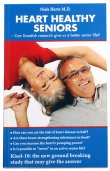New life-saving heart treatment
 The Danish cardiologist and researcher, Chief Physician Svend Aage Mortensen,from the Copenhagen Heart Centre at Rigshospitalet, is very optimistic about a new type of therapy for chronic heart failure where a natural compound is used to increase energy levels in the heart muscle.
The Danish cardiologist and researcher, Chief Physician Svend Aage Mortensen,from the Copenhagen Heart Centre at Rigshospitalet, is very optimistic about a new type of therapy for chronic heart failure where a natural compound is used to increase energy levels in the heart muscle.
“In my opinion, to include this new type of therapy is a paradigm shift in the treatment of chronic heart failure,” says the Danish cardiologist, Chief Physician Svend Aage Mortensen from The Heart Center of Copenhagen University Hospital. He has worked with this specific form of treatment ever since the first clinical studies were conducted in Copenhagen in 1983.
Dr. Mortensen is the lead researcher behind a recently published and groundbreaking international trial called Q-Symbio, which documents that coenzyme Q10 is able to improve the symptoms and course of disease in patients with heart failure. His research has just been published online in the esteemed Journal of the American College of Cardiology, HEART FAILURE.
Stimulates the heart
“Conventional heart failure therapy focuses on inhibiting various hormonal factors that are predominant in heart failure and which strain the heart. With coenzyme Q10, on the other hand, you support cellular processes that relate to the energy metabolism. This provides extra strength to the failing heart muscle,” Dr. Mortensen explains. “Results with other heart-stimulating drugs used in the treatment of heart failure have been disappointing,” he adds.
According to the results of the study, the treatment is highly effective. Patients who were given coenzyme Q10 had a significantly lower mortality rate. In addition, they had fewer hospitalizations due to heart failure, compared with patients who did not get coenzyme Q10.
43% fewer deaths
A total of 420 patients with chronic heart failure participated in the Q-Symbio study, with each patient undergoing a total of two years of treatment. Half of the patients were assigned to three daily 100 mg capsules of coenzyme Q10, while the other half got the same amount of identical dummy capsules with an inactive placebo. The patients in both groups continued with their rather extensive regimen of medicine that is normally prescribed for heart failure.
After two years, there were 43% fewer heart-related deaths in the Q10 group compared with the placebo group. In addition, there were 43% fewer heart-related complications among the Q10-treated participants, including among other things hospitalization due to worsening of the heart failure.
Judging from the study results, Doctor Mortensen suggests that coenzyme Q10 may play an important role as a future adjuvant to conventional heart failure therapy. No side effects were observed with the substance, and an effect was observed in the patients, even though they had already been given the recommended heart failure treatment.
Source: (Journal of the American College of Cardiology, HEART FAILURE, online Oct. 2014)
The heart’s natural source of energyAll cells in the body use coenzyme Q10 in order to make energy that is needed for normal cellular functioning. The body synthesizes the substance but the endogenous production of coenzyme Q10 tapers off with increasing age and may also be compromised by disease. The cells of the cardiac muscle are particularly energy-dependent, which is why these cells contain larger concentrations of coenzyme Q10 than cells in other tissues. In heart failure, however, the situation is different. Coenzyme Q10 levels in the heart drop, causing an energy shortage that prevents the heart muscle from contracting with its usual force. This is what causes shortness of breath and chest pain. When people with heart failure take supplements of coenzyme Q10 the energy turnover in their heart muscle cells is stimulated and that is how the heart gets back its strength. |
Search for more information...
- Created on .








 Most people are unaware of vitamin C’s key role in mental health and mood. According to a large population study that is published in Frontiers in Nutrition, having higher levels of vitamin C in the blood is linked to a lower risk of depression. The official dietary recommendations for vitamin C only focus on preventing the potentially lethal deficiency disease called scurvy, and things like stress, ageing, stimulant use, overweight, infections, and chronic illnesses can increase your need for the nutrient.
Most people are unaware of vitamin C’s key role in mental health and mood. According to a large population study that is published in Frontiers in Nutrition, having higher levels of vitamin C in the blood is linked to a lower risk of depression. The official dietary recommendations for vitamin C only focus on preventing the potentially lethal deficiency disease called scurvy, and things like stress, ageing, stimulant use, overweight, infections, and chronic illnesses can increase your need for the nutrient.


 "After about one week of taking the Q10 supplement I could feel a huge difference," says 23-year old Alan Piccini, who has been suffering from extreme fatigue and muscle aches ever since he was a child.
"After about one week of taking the Q10 supplement I could feel a huge difference," says 23-year old Alan Piccini, who has been suffering from extreme fatigue and muscle aches ever since he was a child. “Taking capsules with co-enzyme Q10 has freed me of the severe side effects of my cholesterol lowering medicine,” Mrs Franken explains.
“Taking capsules with co-enzyme Q10 has freed me of the severe side effects of my cholesterol lowering medicine,” Mrs Franken explains.